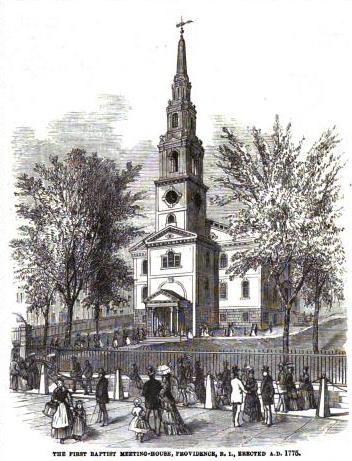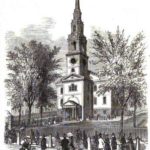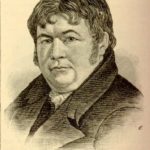Description
Baptist History by J.M. Cramp
From the Foundation of the
Christian Church to the Present Time
Contents
Preface. 2
INTRODUCTORY NOTICE. 2
CHAPTER I. THE PRIMITIVE PERIOD. FROM A.D. 37 TO A.D. 254. 3
Section 1-Introductory Remarks—Pædobaptist Concessions. 3
Section II-The Apostolic Fathers—Justin Martyr—Irenæus. 6
Section III-Tertullian—Baptism of Children in Africa—Origen—First Appearance of Infant Baptism—The Clinics—Christianity in England. 10
CHAPTER II. THE TRANSITION PERIOD. FROM A.D. 254 TO A.D. 604. 18
SECTION I. The Catechumens—Progress of Infant Baptism—Delay of Baptism—Gregory Nazienzen—Chrysostom—Basil—Ephrem of Edessa —The Emperor Constantine—Immersion still the Mode. 18
SECTION II. Christian Intolerance—Justinian’s Law, enjoining Infant-Baptism—The Novatians —The Donatists—Pelagianism. 23
CHAPTER III. THE OBSCURE PERIOD. FROM A.D. 604 TO A.D. 1073. 31
SECTION I.-The Manichaeans—Cautions to the Student —All Opponents of Infant-baptism not Baptists—Account of the Paulicians—Their Views of Baptism. 31
SECTION II. Religious Reform in Europe—The Canons of Orleans—Arras—Berengarius—Miscellaneous Anecdotes. 38
CHAPTER IV. THE REVIVAL PERIOD. FROM A.D. 1073 TO A.D. 1517. 42
SECTION I. State of Affairs in Europe during this Period—The Crusades—Other Important Events—The Scholastic Divines and Philosophers—Universities—Printing. 42
SECTION II. Paulicians in France and Italy —General View of the Reform Movement —Various Names given to the Reformers —Sentiments held by them—False Charge of Manichæism—Their Activity—Reinerus Saccho’s Account 46
SECTION III. Success of the Reforming Parties—Consternation at Rome—Anathemas—The Dominican and Franciscan Orders—Sanguinary Persecution—Crusade against the Albigenses—The Inquisition—Movement in England —John de Wycliffe—The Lollards—Bohemia. 54
SECTION IV. Various Opinions respecting Baptism—Berengar—Peter of Bruys—Henry of Lausanne—Arnold of Brescia—Cologne—England—Lombers—Pope Lucius III. 62
Section V. Heretics of the Fourteenth and Fifteenth Centuries—Wycliffe’s Sentiments on Baptism—The Bohemians—Baptism among the Waldenses—Church Government—Immersion. 71
CHAPTER V. THE REFORMATION PERIOD. FROM A.D. 1517 TO A.D. 1567. 76
SECTION I. Rise of the Reformation—Opinions held by the Baptists—Misrepresented by the Reformers—Their Wonderful Increase—Support under Sufferings. 76
SECTION II. German Baptists—Thomas Munzer—The Peasant War—Michael Satler—Hans Schlaffer—Salzburg—Wolfgang Brand—Hueber—The Burggraf of Alzey—Imperial Edicts. 81
SECTION IV. Baptists in Switzerland—Zuingli—Concessions of Bullinger and Meshovius—Disputations—Drownings—Felix Mantz—Balthazar Hubmeyer—Louis Hetzer—Emigration to Moravia—Jacob Hutter. 92
SECTION V. The Netherlands—Sicke Snyder—Furious Edict—The Inquisition—Severities of Philip II.—Torture—Lysken—Gerrit Hase-poot—Joris Wippe—Private Executions—Horrid Rackings. 102
SECTION VI. Biography of Menno Simon—Account of his Publications—Church Government among the Baptists—Missionary Excursions. 112
SECTION VII. Baptists in England—Proclamation of Henry VIII. —Latimer’s Sermon before Edward VI—Baptists excepted from “Acts of Pardon” —Royal Commissions against them—Ridley—Cranmer—Joan Boucher—Rogers—Philpot—Bishop Hooper’s Scruples—George Van Pare—Protestant Persecutions Inexcusable—Congregations in Essex and Kent—Bonner—Gardiner—Disputations in Gaol—Queen Elizabeth’s Proclamation against Baptists—Bishop Jewel—Archbishop Parker—Dutch Baptists. 123
CHAPTER VI. THE TROUBLOUS PERIOD. FROM A.D. 1567 TO A.D. 1688. 133
SECTION I.Baptist Persecuted by all other Sects—Liberal Policy of William, Prince of Orange—The “Union of Utrecht”—Differences of Opinion—Persecution in Moravia, and in Switzerland. 133
SECTION II. Dutch Baptists Persecuted in England—Account of Hendrick Terwoort and Jan Pieters—Their Martyrdom—Their Religious Sentiments—Whitgift’s Invectives against the Baptists. 139
SECTION III. Severity of Elizabeth’s Government—Bigotry of James I.—The Hampton Court Conference—Emigration—John Smyth’s Church—Their Confessions—Bartholomew Legate—Extracts from Baptist Publications on Liberty of Conscience—The King’s Distress at their Increase. 146
SECTION IV. Character of Charles I—Sufferings during his Reign—First Particular Baptist Church—Samuel Howe—Dr. Featley’s Book—Baptist Confessions of FaithToleration hated by the Presbyterians—Their Attempts to put down the Baptists—Milton’s Lines—The Assembly of Divines—Outcry against Immersion—Parliamentary Declaration in favor of the Baptists—Fearful “Ordinance” against them—Their Activity during the Commonwealth and the Protectorate—Cromwell’s Baptist Officers—The “Triers”—Baptists in Ireland. 153
SECTION V. Character of Charles II. and James II—Commencement of Prosecution—Venner’s Rebellion Disclaimer by Baptists—Sever Sufferings—John James—Act of Uniformity—The Aylesbury Baptists—Benjamin Keach Pilloried—Conventicle Act—Five Mile Act—Their Effects 165
SECTION VI. History of the Broadmead Church, Bristol 179
SECTION VII. Declaration of Indulgence—Confession of Faith—Fierce Persecution—Thomas Delaune—The Duke of Monmouth’s Rebellion—Account of the Hewlings—Mrs. Gaunt—The Dark time—Another Declaration of Indulgence—William Kiffin—The Glorious Revolution 185
SECTION VIII. Principles and Practice of the Denomination—Human Tradition Renounced—Freedom of Conscience Demanded—Personal Piety requisite to Church Fellowship—Purity of Discipline—Cases Cited—Mode of Public Worship—Plurality of Elders—Communion—Singing—Laying on of Hands—The Sabbath. 199
SECTION IX. Biographical Notices—John Smyth, Thomas Helwys, and John Spilsbury—Henry Denne—Francis Cornwell, A.M.—Christopher Blackwood—Major-General Harrison—Colonel Hutchinson. 206
SECTION X. Biographical Notices Continued—Henry Jessey, A.M.—John Canne—Vavasor Powell—Abraham Cheare. 214
SECTION XII. Biographical Notices Concluded—Thomas Grantham—Hanserd Knollys—Benjamin Keach—William Kiffin. 230
SECTION XIII. Baptists in North America—Church at Providence—Baptists in Massachusetts—Persecuting Enactment against them—The Whipping of Obadiah Holmes—First Church at Boston—Newport—Swansea—Other Churches—Roger Williams 245
CHAPTER VII. THE QUIET PERIOD. FROM A.D. 1600 TO A.D. 1800. 256
SECTION I. General Character of the Period—Baptist General Assembly in London—Questions—Particular Baptist Fund—Baptist Board—The Dissenting Deputies—The Book Society—Bristol College—Dr. John Ward—Toleration Act—Schism Bill—Dissenters excluded from Office—Restrictions—Relief—Decline of the General Baptists—Communion Controversy—Effects of High Calvinism on the Particular Baptists—Commencement of Revival—Fuller and Sutcliffe—State of the Denomination in England—Foreign and Home Missions. 256
SECTION II. Biographical Notices—Dr. John Gale—Dr. Gill—John Macgowan—Robert Robinson—Robert Hall, Sen.—John Ryland—The Stennetts—Benjamin Beddome—Samuel Pearce—Dr. Andrew Gifford. 268
SECTION III. Progress of the Denomination in North America—Sufferings in New England—Mrs. Elizabeth Backus—Mrs. Kimball—Virginia—Whitfield’s Preaching—The “New Lights”—Philadelphia Association—Other Associations—Correspondence with London Ministers—Great Revivals—Brown University—Nova Scotia—New Brunswick—Canada. 276
CHAPTER VIII. THE PRESENT CENTURY. 288
Effects of the Mission Enterprise—Revivals—Extension of the Denomination—Statistical Table—Societies—Diversity and Adaptation of Talent—Baptist Agency now Employed—Rev. C. H. Spurgeon—Baptist Union—Peculiarities of the Present Period—Duties of Baptists. 288
Baptist History by J.M. Cramp
Preface
It is desirable that the members of our churches generally should be acquainted with the early history of the Denomination. Hitherto, however, that object could not be attained without the purchase of large and expensive works.
The author has endeavoured to supply this want, and to furnish, in one small volume, an abstract of Baptist records, that all our brethren may know the struggles and sufferings through which their forefathers passed while “witnessing a good confession.”
The work was originally written in the form of Letters, which were addressed “to a Young Christian,” and inserted in the Nova Scotia Christian Messenger during the years 1856-8. They have been revised and rearranged, and the authorities carefully consulted afresh.
J. M. CRAMP.
ACADIA COLLEGE, NOVA SCOTIA,
June 1868.
Baptist History by J.M. Cramp
INTRODUCTORY NOTICE.
Though I have undertaken to say a few words on behalf of this volume of Dr. CRAMP’S, it really needs no introduction. He himself is well known in both hemispheres, and has laboured in both. He has been a student of ecclesiastical history from his youth. Nor has he studied in vain. His work on the Council of Trent is still a standard book on all questions connected with the doctrines and policy of the Church of Rome. His candour and intelligence, his love of good men, and appreciation of great principles, have won the esteem and affection of all who know him. These qualities will be found to distinguish the volume which is now introduced for the first time to English readers.
Though there are Histories of “English Baptists,” of “Foreign Baptists,” and of “American Baptists,” there is no volume in which the history of all is given in a condensed and interesting form. The history of Baptism in the Early Church and in the Middle Ages is still probably to be written, but the reader will find a fuller and more satisfactory account in these pages than anywhere besides.
The volume deserves and will repay careful study, and I very heartily commend it.
JOSEPH ANGUS.
COLLEGE, REGENT’S PARK.
Baptist History by J.M. Cramp
CHAPTER I. THE PRIMITIVE PERIOD. FROM A.D. 37 TO A.D. 254.
Section 1-Introductory Remarks—Pædobaptist Concessions.
Baptists are often asked for information respecting the history of their distinctive opinions and practices. Inquirers say that statements various and even contradictory are made in their hearing, and they are very desirous of being put on the right track, so that they may be able to correct the erroneous and expose the false. It is the object of this work to endeavour to meet their wishes.
Let us begin with the New Testament. Who can read that blessed book with serious attention without coming to the conclusion that the religion of which it treats is personal and voluntary, and that none are worthy to be called Christians but those who “worship God in the Spirit, rejoice in Christ Jesus, and have no confidence in the flesh”? (Phil. 3:3). When Moses addressed the Israelites, and exhorted them to obedience, he included their children in his exhortations, because the children were in the covenant. Judaism, with all its privileges and responsibilities, was hereditary. The rights and duties of the parents became the rights and duties of their offspring, as such. It is not so under the New Dispensation. Men are not born Christians, but they become Christians, when they repent and believe. “As many as received Him, to them gave He power to become the sons of God, even to them that believe on His name; which were born, not of blood, nor of the will of the flesh, nor of the will of man, but of God” (John 1:12, 13). Judaism was a national institute: Christianity is an individual blessing. The Jews were a nation, dealt with as such, and separated from other nations Christians are believers, taken out of all nations, and in Christianity “there is neither Greek nor Jew, circumcision nor uncircumcision, Barbarian, Scythian, bond nor free, but Christ is all and in all” (Col. 3:11). Hence, when the Apostles wrote to Christian churches their mode of address was altogether different from that adopted by Moses. They did not say, “you and your children,” or represent the children as in covenant with God, and therefore entitled to certain rights and bound to the performance of certain duties. The churches to which they sent their epistles were spiritual societies, that is, associations of individuals professing “repentance toward God and faith toward our Lord Jesus Christ” (Acts 20:21), to whom they had surrendered themselves, as their Prophet, Priest, and King. If those individuals were parents, they were taught to bring up their children “in the nurture and admonition of the Lord” (Eph. 6:4); but their children were not classed with them, as the children of the Jews were, nor could they be, till they themselves also repented and believed. It is an obvious inference, that no modern society deserves to be called a Christian Church, which is not founded on such principles as have now been explained.
If you were to place a New Testament in the hands of an intelligent, impartial person, who had never heard of our divisions and denominations, what idea would he be likely to form of the spirit and design of Christianity, or of a Christian Church? Would he not see, in every part of the book, appeals to men’s understandings and emotions, and such requisitions as could be addressed to those only who were capable of thinking and acting for themselves? Would he not conclude that Christianity has to do with mind, that a Christian must be a man of repentance and faith, and that a church is a voluntary society, formed of such men?
We come to the question of baptism. What is baptism? It is “the answer of a good conscience toward God” (1 Peter 3:21). It is “putting on Christ” (Gal. 3:27). It is the voluntary act of a believer, an act of obedience and self-dedication. Such is the uniform tenor of the history. So the multitudes went out to John, “even all the land of Judea, and they of Jerusalem, and were all baptized of him in the river of Jordan” (Mark 1:5). So the Samaritans, “when they believed Philip preaching the things concerning the kingdom of God, and the name of Jesus Christ, were baptized, both men and women” (Acts 8:12). Mark it well—“men and women,”—no children! So, in later times, the baptized were reminded of their obligations: “We are buried with Him by baptism into death, that like as Christ was raised up from the dead by the glory of the Father, even so we should walk in newness of life” (Rom. 6:4).
The New Testament tells of the baptism of believers, and of churches composed of believers. We read of no other baptism, no other churches. It will not do to say in reply that all who were baptized were not believers, and that all the members of Apostolic churches were not sincere. There were, doubtless, hypocrites then, as there are hypocrites now. Even the Apostles were sometimes deceived. But this does not affect the case. All who were baptized professed to be believers, and were baptized as such. The profession of faith was held to be essential to baptism and to church fellowship. None could profess faith who were incapable of understanding the faith. The act of profession implied approbation, conviction, choice.
This, then, is the starting point. Here is the beginning of the history of baptism. With the New Testament only before us, we find baptism connected with the profession of faith. It is a personal, voluntary act; and such an act only is befitting Christianity.
But in the Christianity of the nineteenth century, or what is called such, there is a service of another kind. It is sprinkling—not immersion; and the subjects are infants—not believers. How is this? In what manner was it introduced? How and when did it originate?
These questions will be answered hereafter. This section will be closed by placing before the reader a few extracts from Pædobaptist writers of the nineteenth century, showing how the learned men of these times regard the subject, from an historical point of view.
NORTH BRITISH REVIEW, Presbyterian (article ascribed to the Rev. Dr. Hanna). “Scripture knows nothing of the baptism of infants. There is absolutely not a single trace of it to be found in the New Testament.”[i]
PROFESSOR JACOBI, University of Berlin, Reformed Church. “Infant baptism was established neither by Christ nor by the Apostles. In all places where we find the necessity of baptism notified, either in a dogmatic or historical point of view, it is evident that it was only meant for those who were capable of comprehending the word preached, and of being converted to Christ by an act of their own will.”[ii]
DR. HAGENBACH, Basle, Reformed Church. “The passages from Scripture which are thought to intimate that infant baptism had come into use in the Primitive Church, are doubtful, and prove nothing.”[iii]
NEANDER, the Church Historian. “Baptism was administered at first only to adults, as men were accustomed to conceive baptism and faith as strictly connected. We have all reason for not deriving infant baptism from Apostolic institution; and the recognition of it which followed somewhat later, as an Apostolical tradition, serves to confirm this hypothesis.” . . . “In respect to the form of baptism, it was, in conformity with the original institution and the original import of the symbol, performed by immersion, as a sign of entire baptism into the Holy Spirit, of being entirely penetrated by the same.”[iv]
PROFESSOR STUART, late of Andover, Congregationalist. “There are no commands, or plain and certain examples, in the New Testament relative to infant baptism.”[v]
DR. HODGE, of Princeton, New Jersey, Presbyterian. “In no part of the New Testament is any other condition of membership in the Church prescribed than that contained in the answer of Philip to the eunuch who desired baptism. The Church, therefore, is in its essential nature a company of believers.”[vi]
DR. WOODS, Congregationalist. “We have no express precept or example for infant baptism in all our holy writings.”[vii]
DR. CHALMERS, Presbyterian. “The original meaning of the word baptism is immersion; and though we regard it as a point of indifference whether the ordinance so named be performed this way or by sprinkling, yet we doubt not that the prevalent style of the administrations in the Apostles’ days was of an actual submersion of the whole body under water.”[viii]
DR. BLOOMFIELD, Episcopalian. “There is here (Rom. 6:4) plainly a reference to the ancient mode of baptism by immersion; and I agree with Koppe and Rosenmüller (two German commentators), that there is reason to regret it should have been abandoned in most Christian churches, especially as it has so evidently a reference to the mystic sense of baptism.”[ix]
Rev. W. J. CONYBEARE, M.A., Episcopalian. “This passage (Rom. 6:4) cannot be understood unless it be borne in mind that the primitive baptism was by immersion.”[x]
Many more quotations might be given, but these will be sufficient. It will be observed that none of these writers are Baptists. But they do not venture to affirm that infant sprinkling is derived from the New Testament. Learned Pædobaptist generally admit that believers only were baptized in Apostolic times.
Baptist History by J.M. Cramp
[i]August, 1852.
[ii] Kitto’s Cyclopedia of Biblical Literature. Art. “Baptism.”
[iii] History of Doctrines, i. p. 193.
[iv] History of the Church, i. pp. 310, 311.
[v] Hayne’s Baptist Denomination, p. 31.
[vi] Ibid.
[vii] Ibid.
[viii] Lectures on Romans, chap. 6:4.
[ix] Critical Digest, in loc.
[x] Life and Writings of St. Paul, ii. p. 172. Quarto Edition.
Baptist History by J.M. Cramp





Reviews
There are no reviews yet.